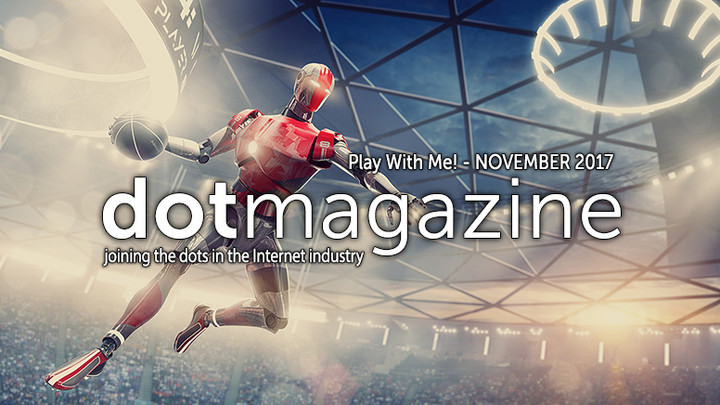doteditorial November 2017
This month, dotmagazine explores the innovations of digital entertainment & AI, looking at how our free time is changing, the impact on global networks, and how business processes are being transformed.

© Pali Rao | istockphoto.com
According to Statista, time spent per day on digital media in the United States will overtake traditional media by 2018. Just in terms of consumption, digital entertainment has become big business.
For all the practical, timesaving, cost-cutting solutions that digital transformation offers, entertainment is still one of the biggest drivers of connectivity and digital innovation. We want to be entertained, when and where we want. Gone are the days when morning commuters had to cramp themselves between the broadsheet newspapers on trains – today, we take last night’s unfinished series with us to binge on it on the smartphone on the way to work. The successes and failures of our favorite sports team are piped through to us when we don’t have the time to go in person. And when it comes to online gaming, you see the reverse – fans packing out stadiums to watch their star players compete in cyberspace.
What we as viewers, fans, and gamers experience is the coalescing of programming and formats – now, what we want can be made available on practically any of our devices. We barely need to stop for breath as we move from one context to another, taking everything with us to and from work, out to lunch, into the classroom.
Making all of this content available for the global consumption of people on the go – that is then the challenge for the publishers and the Internet industry. So this month in dotmagazine, we’re starting off by taking a deep dive into the digital entertainment industry.
Providing the various formats so that I can seamlessly move from my main television or computer to a mobile device, ensuring the stability and reliability of the signal, dealing with issues like latency for live interaction – so that it matters less where in the world your fellow gamers might be – these are just some of the demands placed on the industry. Emile Schouwstra, Chief Commercial Officer at the game hoster i3D.net, explains some of the infrastructure challenges that the global trend towards online gaming creates, and shows how closely these challenges relate to the requirements for availability and security on e-commerce and cloud platforms. Jeffrey Haas, Chief International Officer at Draftkings, gives us an insight into the world of Daily Fantasy Sports – merging the worlds of sports viewing and online gaming – and its impact on the consumption of sports in general. Taking us above the clouds, Markus Payer, Vice President, Corporate Communications & PR at SES ASTRA, looks at satellite transmission of entertainment, and the space technology race that is enabling cruise ship passengers to stream their Netflix series in the middle of the ocean. And Martin Hellmer, Regional Sales Director Central Europe Media at Akamai, provides advice on dealing with the challenges of getting media content delivered reliably and securely to audiences in good quality, and how a CDN with its own global network can support this – reminding us that ‘slow is the new down’ for broadcasters and e-commerce platforms alike.
Looking at the impact of the entertainment sector on business practices is also enlightening. Take the use of video in internal communications in large enterprises, for example. Oliver Jäger, Global Vice President of Marketing and Communications for movingimage, offers advice on integrating video into the company-internal IT landscape without overloading the network. And Lucie Poisson, PhD student at the University of Bern, explores the software industry’s groundbreaking approach to B2B advertising – taking story-telling elements from B2C marketing to achieve a turn-around in the way companies market to each other.
But new systems based on Artificial Intelligence are taking our world by storm – and herein is our second focus topic for this month. We have smart objects, which are not awfully intelligent, as eco Board Member Klaus Landefeld points out in his video interview – because actually the “intelligence typically is somewhere back in the network”. Then we have the intelligent voice assistants appearing in households everywhere, and Michael Wilmes, Senior Manager Public Relations - Division Devices at Amazon Germany, gives insight into the development of Alexa, exactly such an Artificial Intelligence in the network, which hundreds of thousands of developers around the world are currently working on. Rene Buest, Director of Technology Research at arago, takes a different perspective on AI, looking at how it is already used in business environments, and what the potential for it is for enterprises. It's all about “customized products and service offerings aligned with the customer needs,” he says.
However, the machine learning systems being developed at the moment tend to not yet have much in the way of what Reinhard Karger, Head of Corporate Communications at the German Research Center for Artificial Intelligence, calls “knowledge abilities”– the innate human abilities which will continue to differentiate us from AI for a long time to come, in his opinion. Despite this, there are approaches to developing individual human knowledge skills – such as creating works of art (like Google’s DeepDream), or playing games (like Google’s DeepMind playing the ancient Chinese game of Go).
Of course, our specialists in this issue of dotmagazine also touch on the ethical side of the development of Artificial Intelligence. Yes, says Klaus Landefeld, there are issues to be dealt with in the development of Artificial Intelligence with ethical parameters: “We need to give the algorithm guidelines on what is acceptable. And we have to find that as a society”. And no, says Reinhard Karger, the machines are not being designed to replace us: “Artificial Intelligence is a machine and it should stay that way. It is like a bicycle – a quite fantastic machine. But when you and your partner take the bike out on the weekend to go to a cafe, then it’s your partner who joins you in the cafe, and the bike can get locked up out the front.”
The bottom line, as Mathias Röckel points out, is that “companies getting involved with Artificial Intelligence shouldn’t put technology first. They should put humans first”.


